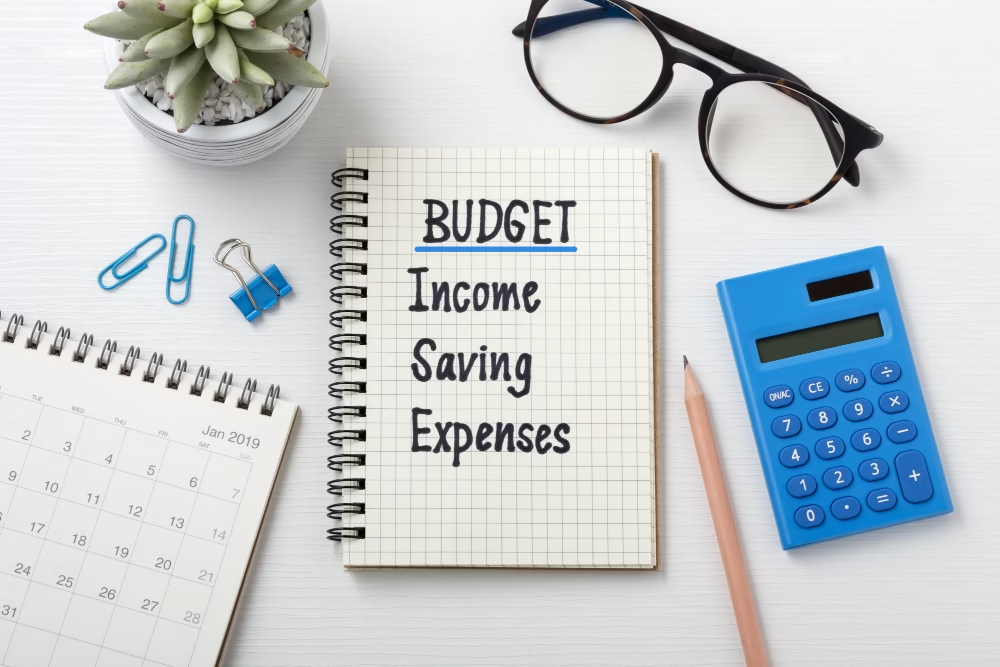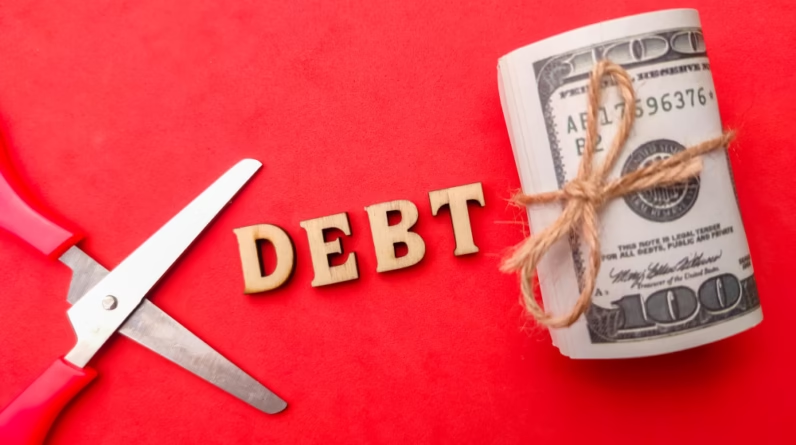
This post may contain affiliate links that at no additional cost to you, we may earn a small commission. Read the Disclosure Policy for more information.
Last Updated on February 9, 2026 by Katie
I spent years in debt before I learned to master my finances in my 30’s. But, with failure, comes a chance to learn and I want to share my best budgeting tips for beginners, that helped me and will hopefully help you live a more financially free future.
And I want to assure you – that budgeting doesn’t mean you can never go out or treat yourself to something new.
It just means becoming more organised and in control of your finances, so you don’t waste money unnecessarily.
A budget gives you a clear view of what you are earning and spending, allowing you to plan your finances and save money more effectively.
Sound good?
Let’s dive in a take a look at the best budgeting tips for beginners.
You might also like:
- How to get free stuff online
- 25 ways to save money on groceries
- How to stop living paycheck to paycheck
Want to Make Extra Money this Weekend?
- Survey Junkie: Earn money by taking surveys and giving your opinion on new products. Over $1.5 million is paid out to members monthly! Join Survey Junkie now.
- American Consumer Opinion: Get paid for your opinion by taking surveys and taking part in research studies. Earn between $1 and $50 per survey. Join ACOP Now.
Easy Budgeting Tips for Beginners to Take Control of Your Finances
Whether you’re a student, stay-at-home Mom or regular 9-5 worker, learning how to budget in a way that suits your lifestyle is essential.
Take a look at the budgeting tips for beginners below and start by getting yourself organised with your budget goals and finance tracking.
And, choose a budgeting method that suits your needs (these free budgeting apps might also help).
Remember, if it’s too restrictive, just like a diet, you will set yourself up for failure.
1: Set Clear Budget Goals
Establishing clear budget goals is crucial for taking control of your finances.
Clear goals provide direction, keeping you focused and motivated. They help you allocate resources efficiently, ensuring you cover essentials while saving for future needs.
To set effective budget goals:
- Identify your financial priorities, such as paying off debt or saving for a vacation.
- Determine specific amounts for each goal.
- Set realistic timelines for achieving these goals.
- Consider both short-term and long-term objectives.
By setting clear budget goals, you can develop a structured plan that optimizes your spending habits.
This approach often leads to better savings. For instance, saving $200 to $300 monthly by cutting unnecessary expenses is feasible.
Check these things to stop buying to save thousands.
2: Track Your Income and Expenses
Tracking your income and expenses is a fundamental step in managing your budget effectively.
Understanding where your money comes from and where it goes allows you to make informed financial decisions and identify areas for improvement.
This habit helps in avoiding overspending and ensuring you have enough funds for essential needs and savings.
To start tracking your income and expenses, follow these simple steps:
- List all sources of income, including salaries, freelance work, and any other regular money inflows.
- Track every expense, from rent and bills to smaller daily costs like coffee and snacks.
- Use a notebook, spreadsheet, or budgeting app to keep a clear record of these transactions.
- Review your expenses weekly to spot patterns and identify areas for potential savings.
By diligently tracking your cash flow, you can reduce unnecessary spending and set aside an extra 10-20% for savings.
3: Choose a Budgeting System
Finding the right budgeting system can make managing your finances simpler and more effective.
Here are four popular budgeting methods you can choose from:
- Zero-Based Budget: Assign every dollar of your income to a specific category, ensuring that your income minus expenses equals zero. This method helps you track all expenses and maximize savings.
- 50/30/20 Rule: Allocate 50% of your income to needs, 30% to wants, and 20% to savings or debt repayment. This easy-to-follow plan provides a balanced approach to spending and financial planning.
- Envelope System: Use cash envelopes for various spending categories. Once an envelope is empty, you stop spending in that category. This helps control overspending.
- Reverse Budget: First, set aside a target saving amount, then allocate the remaining income to expenses. This prioritizes savings over spending.
4: Put Your Spending into Categories
Categorizing your spending is an effective method to manage your budget and identify areas where you might be overspending.
By organizing expenses into categories like housing, food, transportation, and entertainment, you gain clarity on where your money goes each month.
Here are simple steps to categorize your spending:
- Review your bank or credit card statements.
- List all your regular expenses.
- Assign each expense to a specific category.
- Set a reasonable budget for each category.
- Adjust your spending based on these categories.
This method can lead to significant savings. For instance, by reducing extra spending in your entertainment or dining out categories, you could save as much as $100-$200 monthly.
5: Pinpoint Areas Where You Can Cut Back and Save
Identifying areas where you can reduce spending is a key step in maintaining a sustainable budget.
This requires you to take a closer look at your regular expenses and question what is truly necessary.
By shifting your focus to essential spending, you can allocate more funds toward savings or other financial goals.
Consider these straightforward steps to help you identify where to cut back:
- Review your last three months of bank statements and categorize expenses.
- Highlight non-essential categories like dining out, entertainment, and subscriptions.
- Set a specific budget limit for non-essential spending and stick to it.
Making these changes in spending habits can result in noticeable savings.
For instance, cutting back by just $50 per week on unnecessary expenses can amount to approximately $200 each month.
6: Plan to Save an Emergency Fund
Setting up an emergency fund is a smart budgeting strategy that provides financial security.
It acts as a safety net for unexpected expenses, like medical bills or car repairs and building this fund helps prevent you from dipping into long-term savings, like retirement accounts, during emergencies.
To start your emergency fund, try these steps:
- Set a realistic savings goal: Aim for three to six months’ worth of expenses.
- Break down your goal into smaller tasks: Save weekly or bi-weekly.
- Cut unnecessary spending: Identify areas where you can spend less, such as dining out or subscription services.
- Automate savings: Set up automatic transfers to your savings account.
- Use extra income: Allocate bonuses, tax refunds, or gift money towards your fund.
Even modest monthly contributions can add up over time. For instance, saving $100 each month could grow to $1,200 annually.
7: Organize Yourself with a Budgeting Tool or App
While you can track your finances manually, this process can become overwhelming.
Thankfully many budgeting apps will automate the process for you freeing up your time and reducing stress.
These tools help track expenses, categorize spending, and set financial goals and many apps offer features like automatic expense tracking, alerts, and spending reports, making it easier to see where your money goes.
Take a look at these budgeting apps worth your time:
Employing a budgeting tool can realistically help you save $50 to $200 each month by highlighting areas to cut back on.
8: Set Spending Limits to Keep Budget on Track
Having spending limits is one of the best budgeting tips for beginners that’s essential to manage your finances effectively.
By defining boundaries on non-essential spending, you can ensure that your expenses align with your financial goals.
This approach prevents impulsive purchases and helps maintain a balanced budget.
Follow these steps to set your spending limits:
- Identify your monthly income and necessary expenses.
- Categorize your expenses into essential and non-essential.
- Allocate a percentage of your income for non-essential spending, such as dining out or entertainment.
- Use budgeting tools or apps to track your spending in each category.
- Adjust your limits as needed to stay within your financial goals.
By setting spending limits, you could save a significant amount each month.
For instance, if you allocate a maximum of 30% of your income to wants and maintain this discipline, you might save hundreds each month.
9: Regularly Update Your Budget
Your budget goals will change over time, alongside what you earn and what you want to spend money on.
As your life and financial situation change, your budget should reflect these changes.
This practice helps you manage new expenses, increases or decreases in income, and ensures you’re making the most of your financial resources.
Consider the following steps to regularly update your budget:
- Schedule a Monthly Review: Set aside time each month to evaluate your budget.
- Track Income Variations: Note any changes in your income, such as raises or bonuses.
- Adjust for Expenses: Add new expenses or remove those that are no longer relevant.
- Check for Overspending: Identify areas where you’ve spent more than planned.
10: Treat Yourself When You Hit Milestones
As I previously mentioned, budgeting shouldn’t be all scrimping and saving and no fun!
Rewarding yourself after reaching financial goals can keep you motivated and on track to hit your next milestone.
But remember, celebrations don’t have to be costly, but acknowledging your progress is important as small incentives reinforce positive behaviours and give you more reasons to stick to your budget.
To effectively incorporate this into your budget:
- Identify milestones and set realistic goals.
- Allocate a small amount each month for these rewards.
- Choose simple and affordable treats, like a favourite meal or a movie night.
What’s a Budget?
A budget is a financial plan that helps you manage your income and expenses by tracking what you spend.
It allows you to allocate your money effectively, so you can cover essential needs, save for future goals, and enjoy some leisure activities without overspending.
At its core, a budget consists of tracking your income and expenses. Income is the money you receive, such as your salary, while expenses are the costs you incur, like rent and groceries.
Being disciplined and consistent with your budgeting habits can lead to better financial control and security.
It might take some time to adjust, but the payoff in financial management is invaluable.
Why is Budgeting Important?
Budgeting serves as a fundamental tool for financial management, helping you save money, reduce stress, and prevent poor financial decisions.
It’s essential for achieving both short-term and long-term goals.
Here are a few reasons why budgeting is beneficial:
Saves Money
By setting a budget, you identify essential expenses and cut down on unnecessary spending.
This allows you to allocate more money towards savings and investments and small savings can accumulate into a significant amount over time, providing a safety net for unexpected expenses.
Budgeting helps you track spending patterns and adjust accordingly, preventing wasteful expenditures and ensuring that every dollar is used wisely.
Furthermore, effective budgeting empowers you to plan for big purchases, making them more manageable by breaking costs into smaller, achievable amounts.
Reduces Stress
Another benefit of budgeting is that having control over your finances can significantly alleviate stress.
A clear budget presents a comprehensive view of your income and expenditures, reducing uncertainty.
With pre-planned finances, you’re less likely to encounter unexpected shortfalls and being aware of where your money goes allows you to feel more secure and confident in your financial situation.
The structured approach of budgeting cultivates discipline, promoting stability and peace of mind, which is crucial for overall well-being and stress reduction.
Avoids Poor Financial Decisions
Budgeting provides a roadmap that guides decision-making concerning purchases and investments.
By knowing your financial limits, you’re less likely to engage in impulsive financial behavior which helps avoid accruing unnecessary debt and financial pitfalls.
A budget helps prioritize essential spending, ensuring necessary commitments such as bills and savings are met before discretionary spending.
And, by maintaining a budget, you make informed choices that align with your financial goals, helping you stay on track towards achieving them.
Budgeting Tips for Beginners – FAQs
Take a loo at the few common questions asked about budgeting for beginners.
What is the simplest budgeting method?
One popular method is the 50/30/20 rule. You allocate 50% of your income to needs, 30% to wants, and 20% to savings.
This approach simplifies financial planning by clearly dividing your money into manageable categories, allowing you to maintain control over your finances with minimal effort.
What are common budgeting mistakes to avoid?
One major mistake is not tracking expenses, which can lead to overspending.
By tracking what you spend money on, you will usually see areas where you are spending unnecessarily.
Also, avoid creating overly strict budgets that are difficult to stick to. If a budget is too strict, you just set yourself up to fail.
Furthermore, remember not to overlook irregular expenses, like annual subscriptions and pay attention to unnecessary subscriptions, as they can add up quickly and disrupt your financial plans.
How should students approach creating a budget?
Students should begin by listing all sources of income, including part-time jobs and allowances.
Next, you need to track your expenses to identify spending habits and categorize your spending into essentials like rent and groceries, and non-essentials like entertainment.
Finally, opt for a flexible budgeting system that accommodates fluctuating income and expenses while still prioritizing savings when possible.
Life as a student can be tough, but with a budget, you can manage your finances effectively and still allow yourself money to have a few fun nites out.
Final Thoughts on Budgeting Tips for Beginners
Budgeting effectively takes practice so don’t beat yourself up if you don’t succeed straight away.
Start again and use these budgeting tips for beginners to build a better financial future that aligns with your lifestyle and needs.
If one budget system doesn’t work for you, try one of the others and keep trying till you get it right.
But, most of all, don’t forget to reward yourself when you do have small wins – life is for living after all!











